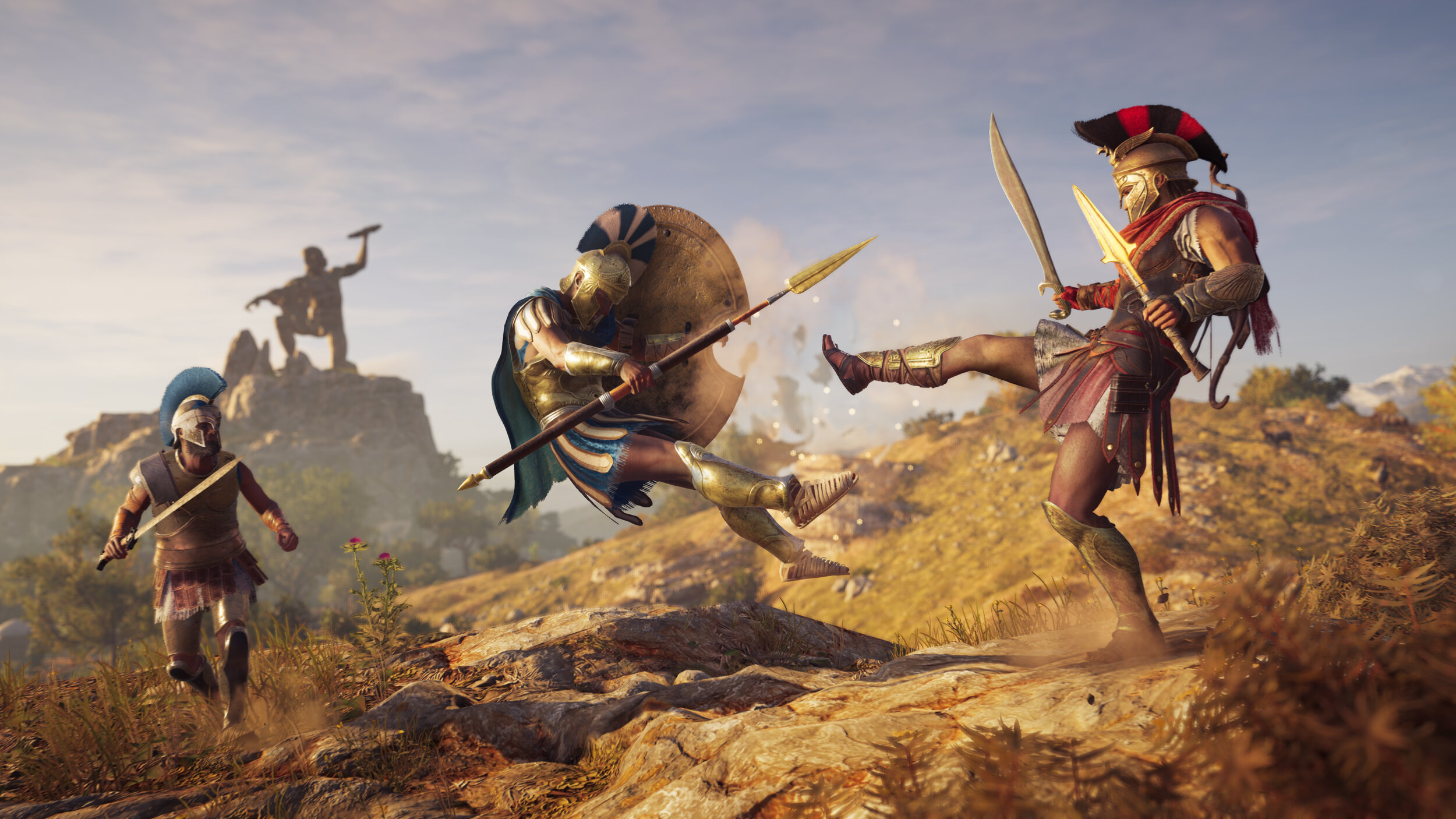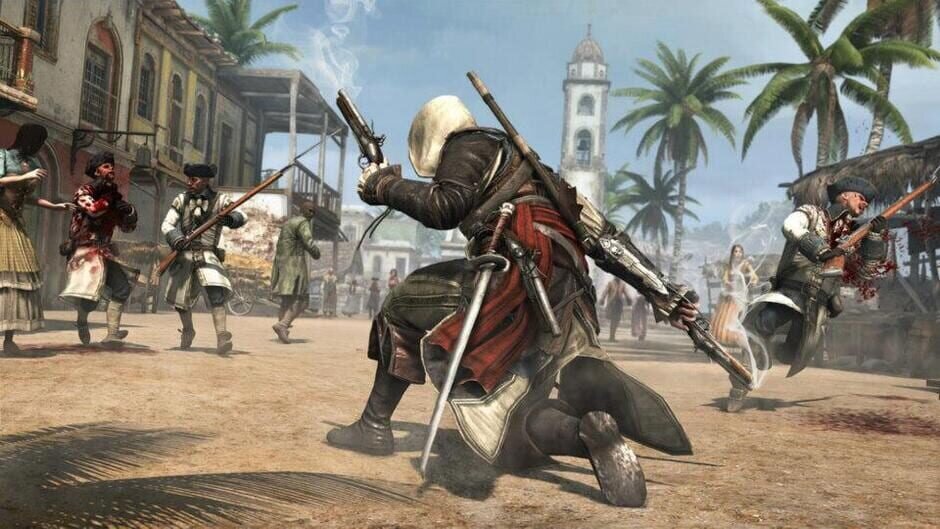History and Conspiracy in the Assassin's Creed Series
Christopher Breu, Contributing Editor
Playing the Assassin’s Creed games is a lot like watching the History Channel. Carefully rendered images and accounts of the historical past sit side by side with accounts of global conspiracies and secret but ubiquitous alien influence. Actually, the AC series seems split between two visions, just like different periods of the History Channel’s existence. There is the commitment to mainstream but relatively meticulous historicism in which the details of everyday life and historical events are recounted with detailed care and accuracy. Actual academic historians are sometimes consulted. This version of historicism can be loosely affiliated with the first incarnation of the History Channel. As with other upstart cabled channels, such as A&E, invested in bringing the “arts and culture” to television audiences, the History Channel initially had its first incarnation as a channel that aired respectable and relatively accurate recreations of historical events. The model here seemed to be PBS’s periodic series about historical events, with Ken Burns’ documentaries being the most prominent. Aspects of the Assassin’s Creed series, in its relatively meticulous reconstruction of historical cities and locales, shaped in consultation with professional historians fits this version of historicism.
Assassin’s Creed II: the Ezio saga begins.
I remember the first time I played Ezio, in AC II. I was absolutely blown-away by the meticulous reconstruction of famous buildings and spaces and even everyday cultural practices (this was my first introduction to the indelible image of the plague doctor, for example). As someone who’s traveled in Italy, I was shocked and excited that the Venice of AC II felt like the beautiful, decaying city that I fell in love with. In fact, the last time I was in Venice, traveling with a partner with ALS on her last trip abroad, I used my memory of the space from the game to help us navigate the city with greater ease and less exertion. Who says video games don’t contain valuable knowledge?
The same attention to historical detail is also present in the games that have appeared in the “soft reboot” of the series. Right now, I’m playing AC Odyssey, and while I’m no expert on Ancient Greek history, as someone whose day job involves a certain amount of knowledge of classical literature and philosophy, I am similarly impressed with the immersive version of the Greek world they created, right down to a Mediterranean that hasn’t been chronically over-fished and is still teeming with life. Indeed, in our own moment of climate crisis, we now recognize how climate and ecosystems themselves are historical. The newer AC installments powerfully recognize this fact. So, this, like the Ken Burns documentary, is the respectable side of the AC franchise...
Then, of course, there is the other, much less respectable version of “history” narrated by the AC games. These are the versions of history as conspiracy, recalling nothing so much as the more recent offerings of the History channel, replete with aliens, secret societies, and vast transhistorical conspiracies. It can feel a bit like the Q-Anon believers rewriting world history wholesale, right down to erasing ancient, nonwhite, and Indigenous civilizational achievements by crediting them to aliens: It’s not the ancient Egyptians who built the pyramids, but aliens. The AC games have their own problems with issues of race and selective accounts of world history. They have yet to feature a mainstream game in the series that breaks demonstrably from the version of “Western Civilization” that most Americans and Europeans learned in school.
Yet, before we write off the conspiratorial dimensions of the AC games as capitulating to the worst elements of our own paranoid and racist zeitgeist, the conspiracies in the games do an important form of historical work, one not available to the more respectable PBS style historicism that otherwise informs them. It’s important to distinguish between different kinds of conspiracies. While conspiracy theories are almost always inaccurate and crude ways of understanding historical power, they can also provide an account of the more abstract but still determining forms of power, such as the power of economic systems or popular conceptions of freedom, which conventional historicism often misses.
Assassin’s Creed: Odyssey. The2nd game in the series’ soft reboot, focusing on Ancient Greece.
Moreover, while conspiracy theories are typically inaccurate, not all are right-wing. For example, Patricia Turner demonstrates that rumor and conspiracy theories that circulate in the African American community, while often involving historical inaccuracies, provide powerful alternative ways of understanding the workings of racist power in the face of official historicisms that whitewash long histories of white supremacism and settler-colonial violence in the United States. Similarly, Fredric Jameson argues that conspiracy theories (and conspiracy films) function as an attempt to map the invisible totality presented by global capitalist power. Capitalist power is diffuse and abstract, yet profoundly determining of uneven life chances. Conspiracy becomes one way of giving a face to such abstract forms of power. It’s also a way of providing an account of larger forms of historical causality than is available in the seemingly individualist or narrowly political accounts of cause and effect that is the stuff of conventional historicism.
Assassin’s Creed’s Assassins and Templars, read allegorically, are just such large-scale causal forces. The Templars are invested in control and world conquest. In the original games in the series, they are linked to the violence of the crusades, organized and hierarchal religion, and various forms autocratic control. In later games, and in the parts of the game that are set in the present, they are linked to the multinational corporation, Abstergo Industries, which, in a nice metafictional turn, run the videogame company that ostensibly produces the games we’re playing.
Assassin’s Creed IV: Black Flag - piracy, revolution, the high seas.
But there’s also a utopian vision also at work in the Templars—one that’s about creating the perfect human society through control and order. The Assassins on the other hand, are invested in horizontal forms of association and power, democratic and often anarchist social organization, and multicultural and multi-faith visions of human cosmopolitanism from below. Freedom is their watchword. Perhaps the game in which their vision is most fully realized is AC Black Flag, in which the historical world of piracy, which represented a powerful anti-imperialist and anti-capitalist alternative to the workings of the British and Spanish imperial rule, created alternative societies of outcasts who were linked by free association and an embrace of various forms of difference.
Interestingly, in more recent iterations of the series, the line between the Templars and the Assassins has become more complicated. The Templars’ drive for order and hierarchy is sometimes presented as useful or necessary, while the Assassins’ investment in horizontalism and absolute freedom is also presented as sometimes undermining the possibility of building effective and lasting forms of human association. These days, AAA videogames are less inclined to advertise a strong political message (see the shift from Bioshock to Bioshock Infinite, with its shift from the former’s powerful critique of neoliberalism to the latter’s proto-Trumpian equation of racists and anti-racists as equally guilty).
Assassin’s Creed: Revelation
We could read this relativizing of the relationship between the Assassins and the Templars as part of this depoliticizing dynamic, but I actually think the relativizing of these two positions serves a more philosophical aim in the games, at least when they’re at their best: The representation of the Templars as the series villains is righteous in its critique of both totalitarian fantasies and imperial violence. Yet, detached from this larger history, the drive toward freedom needs to be tempered with order or organization (and vice versa). Both the Assassins and the Templars are part of the world historical transformation that produced the French Revolution in AC Unity. And, indeed, revolutions need both an investment in radical forms of popular political power and some vision of post-revolutionary order, in which certain versions of hierarchy (though not autocracy) may be necessary. Even revolutionary organizations invested in equality and democracy need forms of order and hierarchy to have lasting effect, as the lack of any lasting effect produced by Occupy Wall Street, for all of its anarchist power, demonstrated. Indeed, if the pandemic has taught us anything, it’s that words like “freedom” may not always have a liberating valence (see, for example, the “freedom” to not wear a mask) and top-down forms of public policy sometimes have real value and necessity.
Such are the lessons of the Assassin’s Creed games at their best. They move past the PBS world of history as an accumulation of individual stories to history as a grand canvas. In a world facing global threats like pandemics and climate crisis, such a broad canvas is necessary.
For more in “History’s Arcades,” check out the introduction to the series, Christian Haines’s article on The Medium, history, and haunting, and Don Everhart on how Moose Life reinvents 1980s arcade action!







